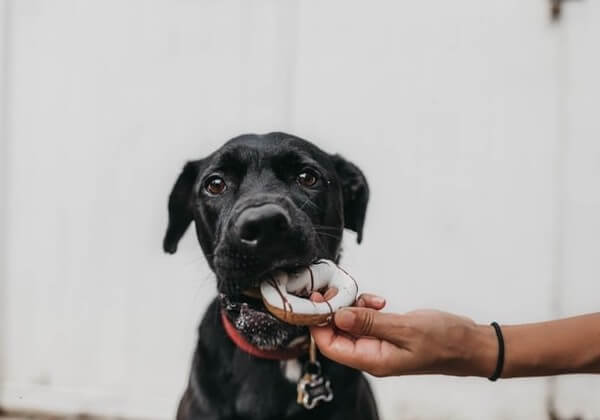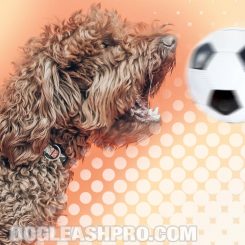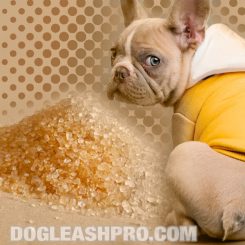
You’re enjoying a Donut or two for breakfast when your dog runs over to you and beg for some with their puppy eyes. As you’re ripping off a small piece of the glazed Donut, you’re probably wondering, “can my dog eat Donuts?” Are donuts safe for doggy consumption? Here’s the short answer first.
Can dogs eat Donuts? No, dogs should not eat Donuts because they are high in carbs, calories, and fat. Be extra careful not to feed your dogs Donuts that have been deep-fried, glazed, or slathered with tasty frostings. Frostings like chocolate are toxic to dogs and Donuts with added flavors mean there’s a lot of sugar in them which is harmful to your dog’s health.
Below, we will discuss in detail why dogs should avoid Donuts (both plain and flavored), why consuming both sugary food and food full of carbs are bad for your dog’s overall health, and what to do if your dog stole a Donut or two. Keep reading to find out everything you need to know about dogs and donuts.
Table of Contents
Can dogs have Donuts?

No, dogs should not have Donuts at all. While some human foods are safe to share with our canine friends, the same can not be said of Donuts. Even if your furry friends are begging you with their puppy eyes, resist the temptation to give them Donuts – even if it’s a little bit.
To fully understand why it’s important to keep this sugary food as far away from your pooch as possible, it’s crucial to go over what Donuts are and how they are made.
What are Donuts?
The word “Donut” came from the original word “doughnut.” As we can see, Donuts are made of dough. Popular in many countries around the world, Donuts is a sweet snack made of leavened fried dough that can be enjoyed as a snack or dessert or even during Breakfast.
There are various different types of Donuts. The three most common types of Donuts are ring Donuts, filled Donuts, and Donut holes.
A Ring Donut looks like a bagel with a hole in the middle. The filled Donuts are the ring Donuts with sweet fillings inside like jelly, custard, or cream. The jelly is usually from fruit preserves. Then, there are the Donut holes which are small round dough. The Donut holes can also have sweet fillings inside as well.
All three types of Donuts can have various flavorings and toppings. Donuts can be frosted, have maple or chocolate glazing, or be powdered with sugar, cinnamon, blueberry, and pumpkin spice.
So while there are plain Donuts, Donuts coated with sweet delicious frostings are usually much more popular and are eye-catching to many.
You can find Donuts at your local grocery stores, supermarkets, bakeries, food stalls, or franchised Donut vendors like Dunkin Donuts. Or you can also make the Donuts yourself at home.
How are Donuts made?
Donuts are made mainly from flour dough and a number of other ingredients. They are then deep-fried in canola oil or other vegetable oil. When that’s done, they are then glazed or filled with sweet fillings.
Does this make Donuts harmful for canine consumption? Let’s find out next.
Are Donuts bad for dogs?

Yes, Donuts are bad for dogs because of the ingredients used to make them and how they are made.
Let’s take a brief look at the ingredients in your typical yeast-leavened Donuts:
- All-purpose flour.
- Shortening.
- Milk.
- Granulated sugar.
- Salt.
- Water.
- Dry yeast.
- Butter.
- Eggs.
- Canola or vegetable oil.
- Flavorings.
As we can see, many of the ingredients listed above are not safe for doggy consumption. If your pooch is sensitive to gluten or has a wheat allergy, you should avoid feeding him Donuts since the main ingredient for Donuts is all-purpose flour.
You may also like: Can Dogs Eat Crackers?
We can also see that Donuts contain milk which is a dairy product. If you know your four-legged friends are lactose intolerant, it’s best to keep Donuts away from them. That’s because dogs that are lactose intolerant are not able to properly digest lactose, the sugar found in milk.
Signs and symptoms of lactose intolerance in dogs include:
- Vomiting.
- Diarrhea.
- Loss of appetite.
- Bloating.
- Flatulence.
Some of the ingredients in Donuts can also cause weight gain in dogs, specifically sugar and butter. When dogs consume sugary food like Donuts, they are at risk for dental disease, diabetes, weight gain, metabolism changes, a sudden spike in blood sugar level, and even pancreatitis.
Butter is also bad for dogs since it is considered fat for dogs.
You’ll also notice that many recommend using canola oil to deep fry the Donut because it gives the Donut that signature light tan color with a mild flavor. Also, canola oil has a high smoke point so they are the perfect oil type for frying Donuts.
However, canola oil is not recommended for our precious pooch. Canola oil is not healthy for our K9 friends and it also doesn’t provide our pups with many health benefits. Here is a list of healthier, canine-friendly oil options for dogs:
- Coconut oil.
- Fish oil.
- Olive oil.
- Flaxseed oil.
- Sunflower oil.
Flavoring is an absolute no-no for dogs. If you plan on feeding your pooch any human food, make sure it is safe for doggy consumption first. If it is, make sure the food is plain with no added flavoring.
If the food or snack contains tons of sugar, carbs, calories, and fat (as in the case with Donuts), offering a little bit is fine if it’s a rare treat every now and then. Avoid feeding your pooch plain Donuts daily or regularly.
Donuts and Dogs
In this section, we’ll go over some of the most popular Donut flavors you’ll find in your local bakery, franchised Donut vendors, or supermarket and discuss whether they are safe for your dogs to eat.
Can dogs eat glazed Donuts?
If you’re wondering, “Can my dog eat a glazed Donut?” the answer is no, dogs should not eat glazed Donuts. The plain Donuts themselves are already unhealthy for dogs since they contain tons of sugar and fats. They are also full of carbs and calories.
When you glaze the Donuts, they’re even worse for dogs. That’s because the glazing is made of sugar so glazed Donuts contain high sugar content.
So, can dogs have glazed Donuts?
As we can see, dogs should not have glazed Donuts. Glazed Donuts are considered empty-calorie food for dogs because they can cause weight gain and health issues in dogs without providing them any nutritional value or benefit.
Can dogs eat powdered Donuts?
No, dogs should not eat powdered Donuts. If you’re wondering, “Can my dog eat powdered Donuts?” the answer is an absolute no-no. Are powdered Donuts bad for dogs? Yes, powdered Donuts are bad for dogs because they are coated in white powdered sugar – and lots of it.
Immediately after eating a powdered Donut, your dog’s blood sugar level will suddenly spike and he will have the zoomies. If your pooch eats powdered Donuts regularly, he may be at risk of weight gain and canine obesity.
Check out: Can Dogs Eat Cotton Candy?
So, can dogs have powdered Donuts?
As you can see, dogs should not have powdered Donuts. Allowing your canine friends to regularly consume powdered Donuts puts them at risk for dental disease (cavities and tooth decay), diabetes, weight gain, metabolic changes, upset stomach, and even pancreatitis.
Can dogs eat plain Donuts?
Ideally, dogs should not eat plain Donuts either. That’s because plain Donuts themselves contain high amounts of sugar and fat. Our furry friends are not able to properly digest sugary ingredients and it can cause our pups to develop pancreatitis.
Eating lots of plain Donuts can also cause upset stomach in dogs. Your pup will vomit or have diarrhea.
Plain Donuts are also considered empty-calorie food since they don’t provide much if any nutritional value for our dogs. Instead, they are packed full of calories, carbs, fat, and sugar which will harm our K9 friend’s overall health.
What can dogs eat from Dunkin Donuts?
Certainly not Donuts! Dogs should not have plain or flavored Donuts from Dunkin Donuts. So if you’re wondering, “Can dogs eat Dunkin Donuts?” the answer is no, dogs should not eat Dunkin Donuts.
Instead of Donuts, you can ask the staff behind the counter for a puppy latte or whipped cream in a small cup. Some Dunkin Donuts have doggy treats as well. Make sure your furry family member isn’t lactose intolerant before offering them the puppy latte.
Can dogs eat cinnamon Donuts?
No, dogs should not eat cinnamon Donuts. While cinnamon on its own is not toxic to dogs, cinnamon Donuts are harmful to dogs. That’s because Donuts are harmful to your dog’s health since they are full of sugar, fat, carbs, and calories. Our four-legged friends aren’t able to properly digest cinnamon Donuts.
Can dogs eat blueberry Donuts?
No, dogs should not eat blueberry Donuts. While blueberries themselves are great for dogs, blueberry Donuts are not healthy for doggy consumption. The blueberry in this case is added onto the Donuts and the Donuts are not healthy for dogs.
As discussed above, Donuts are deep-fried in canola oil which isn’t good for our dog’s health. They are also high in sugar. The combination of sugar and fat in Donuts alone can lead to health problems such as weight gain, obesity, cavities, tooth decay, diabetes, and pancreatitis.
With that said, it’s best to keep fatty food like Donuts away from your furry family members.
Can dogs eat chocolate Donuts?
No, dogs should not eat chocolate Donuts at all. If you’re enjoying some chocolate frosted Donuts, keep them as far away from your dog as humanely possible.
Not only are the Donuts themselves harmful to your dog’s health since they are loaded with carbs, sugar, and fats, but also the added chocolate flavor is extremely toxic to dogs.
Any and all types of chocolate are harmful to dogs. It doesn’t matter if it’s milk chocolate or dark chocolate. It’s important to note that any amount of chocolate is also toxic to dogs.
My dog ate a chocolate Donut! What should I do?
Dogs that accidentally ate chocolate Donuts will experience symptoms of chocolate poisoning. Signs to watch out for include the following:
- Extreme thirst.
- Frequent urination.
- Vomiting.
- Diarrhea.
- Difficulty breathing.
- Increase heart rate.
If you suspect your dog has chocolate poisoning, call your vet immediately. Chocolate poisoning requires immediate medical attention and treatment.
Can dogs eat Donut holes?
No, dogs should not eat Donut holes. Everything we discussed about with Donuts applies to Donut holes as well. Like Donuts, Donut holes are also high in fat and sugar. That’s because both Donut holes and Donuts use the same or similar ingredients.
Donut holes also come in various flavors. Some are powdered while others are glazed. There are also Donut holes that come in chocolate flavors. No matter what type of Donut holes or what flavor they are, do not share them with your canine pals.
Can dogs eat jelly Donuts?
No, dogs should not eat jelly Donuts. The ingredients for the red jelly filling are usually:
- Sugar.
- Corn syrup.
- Apple juice concentrate.
- Preservatives.
As we can see, none of the ingredients listed above are healthy for our furry friends. Not only are the Donuts already unhealthy for our dogs, the jelly filling ingredients add insult to injury.
When dogs eat jelly Donuts, they will have sugar overload and a whole host of health issues can come from consuming too much sugar.
You may be interested in: Can Dogs Eat Jelly Beans?
So, can dogs eat Donuts?
If you’re enjoying some Donuts, try your best not to share them with your furry friends. Donuts are in no way, shape, or form healthy for our canine friends. Your dogs may give your those puppy eyes, but don’t be tempted and give in.
While we feel the need to share our food with our furry family members, sharing is not always caring in this case. To avoid any health problems or emergencies, do not offer any Donuts or Donut Holes (plain or flavored) to your dogs.
DISCLAIMER: THIS WEBSITE DOES NOT PROVIDE MEDICAL ADVICE
The information, including but not limited to, text, graphics, images and other material contained on this website are for informational purposes only. No material on this site is intended to be a substitute for professional veterinary advice, diagnosis, or treatment. Always seek the advice of your veterinarian or other qualified health care provider with any questions you may have regarding dietary needs.
Resources:
https://en.wikipedia.org/wiki/Doughnut
https://www.avma.org/javma-news/2019-03-01/study-finds-overweight-dogs-live-shorter-lives

With over five years of specialized experience as an animal writer, my expertise lies in dog nutrition, health, behavior, grooming, and training. I am dedicated to delivering helpful and informative content that caters to the well-being of our furry friends. My primary goal is to empower pet owners with knowledge and ensure our canine companions thrive in health and happiness. In my free time, I love volunteering at local dog rescue centers.







